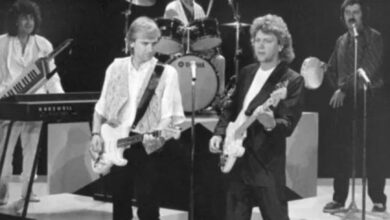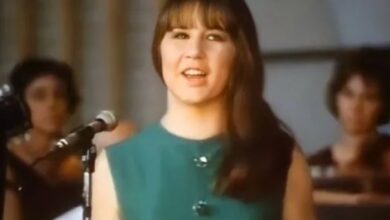His performance of the third verse is the apex of musical brilliance
Elvis Presley’s live rendition of “Never Been to Spain” in 1972 stands as a pivotal moment in his illustrious career, showcasing his ability to breathe new life into existing hits with his distinctive style and charismatic stage presence. Written by Hoyt Axton and originally recorded by Three Dog Night in 1971, the song found new resonance through Elvis’s interpretation, blending rock, blues, and soul into a compelling musical tapestry.
From the moment Elvis takes the stage, his commanding presence is palpable. Backed by a tight rhythm section and punctuated by powerful horn arrangements, the performance opens with a driving energy that sets the tone. Elvis’s vocals, as always, are a tour de force—his voice, a blend of raw power and soulful nuance, captures the essence of the song’s yearning lyrics.
“Never Been to Spain” tells the tale of a man who dreams of exploration and adventure, despite never having left his homeland. It’s a narrative that resonated deeply with Elvis, reflecting themes of longing and wanderlust that often permeated his own life and career. His rendition infuses the lyrics with emotional depth, each word delivered with conviction and clarity, showcasing his ability to convey complex emotions through song.
The live recording from Las Vegas not only captures Elvis at his vocal peak but also highlights his prowess as a performer. Throughout the song, he effortlessly navigates its shifts in tempo and mood, drawing the audience into his world with every impassioned note. His interaction with the crowd is magnetic, as he connects with them on a visceral level, igniting a shared experience of musical euphoria.
Beyond the technical mastery of his vocals, Elvis’s rendition of “Never Been to Spain” underscores his role as a cultural icon. His influence transcended music, shaping popular culture with his unique blend of charisma, style, and boundary-pushing performances. In this live moment, he reaffirms his status as the King of Rock ‘n’ Roll, leaving an indelible mark on music history.
Elvis Aaron Presley was born on January 8, 1935, in Tupelo, Mississippi. From humble beginnings, he rose to become one of the most significant cultural icons of the 20th century. His impact on music, particularly rock ‘n’ roll, cannot be overstated. With a string of hit records, electrifying performances, and a magnetic presence on and off stage, Elvis redefined popular music and paved the way for future generations of artists.
His early recordings at Sun Records in the 1950s catapulted him to fame, blending elements of blues, gospel, and country into a revolutionary new sound. Songs like “Heartbreak Hotel,” “Hound Dog,” and “Jailhouse Rock” became instant classics, showcasing his dynamic voice and infectious energy. As his career progressed, Elvis’s versatility as a performer became increasingly evident, spanning genres from rockabilly to ballads, from gospel to blues.
Throughout his career, Elvis’s live performances were legendary, characterized by his magnetic stage presence and ability to captivate audiences worldwide. His concerts, particularly his residencies in Las Vegas during the 1970s, became iconic showcases of his talent and showmanship. Each performance was a testament to his ability to connect with his audience, transcending language and cultural barriers through the universal language of music.
Elvis’s influence extended far beyond music. He became a cultural phenomenon, embodying the spirit of rebellion and youthful exuberance that defined the post-war era. His impact on fashion, film, and popular culture as a whole was profound, shaping trends and attitudes for decades to come.
Tragically, Elvis’s life was marked by personal struggles and health issues, which ultimately led to his untimely death on August 16, 1977. Yet, his legacy endures, not only through his vast catalog of recordings but also through the enduring impact he had on the music industry and popular culture at large.
In conclusion, Elvis Presley’s live performance of “Never Been to Spain” in 1972 encapsulates everything that made him a cultural icon. It showcases his unparalleled vocal talent, his ability to reinterpret songs with his unique style, and his profound connection with audiences. More than just a performance, it is a moment frozen in time—a testament to the enduring power of Elvis Presley as the King of Rock ‘n’ Roll.





